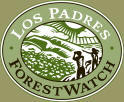|
June 13, 2006
FORESTWATCH
NOTIFIES AGENCIES TO
HALT EXPANSION OF OIL DRILLING IN
LOS PADRES NATIONAL FOREST
Groups Demand
that the Federal Government Take Action to Protect Wildlife and
Avoid Lawsuit Over Legal Violations
Santa Barbara, Calif.
–
Today Los Padres
ForestWatch, Defenders of Wildlife and Center for Biological
Diversity filed a formal notice of intent to sue several federal
agencies over plans to expand oil drilling in the Los Padres
National Forest. The notice charges the U.S. Forest Service,
U.S. Fish and Wildlife Service, and the National Marine
Fisheries Service with violations of the Endangered Species Act
and demands the agencies take action to protect rare plants and
animals.

An orange
grove borders one of the new oil drilling areas near the town of
Santa Paula.
“The Los
Padres National Forest attracts millions of visitors each year
to take in its scenic vistas, escape nearby city life, and enjoy
a wide range of recreational opportunities, including
world-class fly fishing, hiking and wildlife viewing,” said Jeff
Kuyper, Executive Director of Los Padres ForestWatch. “These
visitors bring in more than $75 million annually to our local
businesses, and we can’t afford to risk it all for less than a
day’s supply of oil.” The Forest Service estimates that new oil
drilling would produce less than one day's supply of oil over
the next ten to fifteen years, leading many to wonder why the
agency is willing to risk so much, for so little.
According to a
2004 report by the Forest Service and Michigan State University,
the Los Padres is one of the most heavily-visited national
forests in the country, attracting millions of visitors from San
Francisco to Los Angeles and beyond. The study revealed that
forest visitors spend an average of $43 each day they visit the
LPNF. With nearly two million visitors per year, the LPNF is a
boon to the bottom line of the local economy.

The Los Padres National Forest Oil
and Gas Leasing plan,
approved by the Forest
Service in July 2005, authorized the
expansion of oil drilling across 52,075 acres of the LPNF
in Santa Barbara and
Ventura counties. The project will negatively impact wildlife,
including the extremely
imperiled California condor and many other plants and animals
listed under the Endangered Species Act. The decision allows
surface drilling within a stone’s throw of the Sespe Condor
Sanctuary and the Hopper Mountain
National Wildlife Refuge, two
areas critical to the survival and recovery of the endangered
California condor. In addition, the decision allows surface
drilling immediately
adjacent to three
designated wilderness areas and slant
drilling beneath
three river segments eligible for
federal Wild & Scenic River
designation – Sespe, Piru, and Santa Paula creeks.
These same
groups appealed the plan shortly after it was approved last
year. Their appeal notified the agency of several legal and
scientific concerns with allowing oil drilling to expand into
these sensitive areas, and asked the agency to reconsider its
decision. The agency denied the groups' appeal earlier this
year, and denied a similar appeal filed by the California
Attorney General's Office.
 “We
believe that a mutually-agreeable resolution can be achieved so
we can save this vital part of California’s natural heritage,”
said Gina LaRocco, Staff Attorney for Defenders of Wildlife. “We
hope the managing agencies take appropriate action to resolve
these issues, and we stand ready to partner with them.” “We
believe that a mutually-agreeable resolution can be achieved so
we can save this vital part of California’s natural heritage,”
said Gina LaRocco, Staff Attorney for Defenders of Wildlife. “We
hope the managing agencies take appropriate action to resolve
these issues, and we stand ready to partner with them.”
“The agency
has relied on outdated data and unsubstantiated opinions to
conclude that new oil drilling will not have any significant
impacts,” said John Buse, Staff Attorney with the Center for
Biological Diversity. “Exploration
alone can have serious consequences for condors and other
wildlife in the Los Padres National Forest, even if it never
leads to the production of a drop of oil."
|

